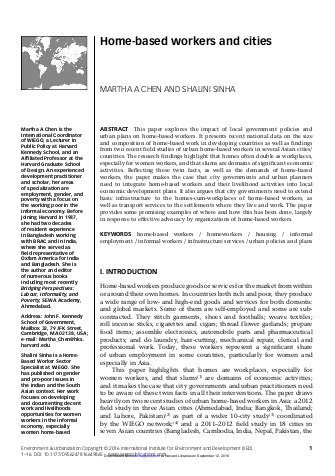Environment and Urbanisation | Special Issue on Urban Livelihoods

This paper explores the impact of local government policies and urban plans on home based workers. It presents recent national data on the size and composition of home-based work in developing countries as well as findings from two recent field studies of urban home-based workers in several Asian cities/ countries. The research findings highlight that homes often double as workplaces, especially for women workers, and that slums are domains of significant economic activities. Reflecting these twin facts, as well as the demands of home-based workers, the paper makes the case that city governments and urban planners need to integrate home-based workers and their livelihood activities into local economic development plans. It also argues that city governments need to extend basic infrastructure to the homes-cum-workplaces of home-based workers, as well as transport services to the settlements where they live and work. The paper provides some promising examples of where and how this has been done, largely in response to effective advocacy by organizations of home-based workers.
Links
Resource collections
- UN Habitat - Urban Response Collection
- Urban Response - Urban Crisis Preparedness and Risk Reduction
- Urban Response Collection - Community Engagement and Social Cohesion
- Urban Response Collection - Economic Recovery
- Urban Response Collection - Environment and Climate Change
- Urban Response Collection - Housing, Land and Property
- Urban Response Collection - Urban Crisis Response, Recovery and Reconstruction
- Urban Response Collection - Urban Resilience